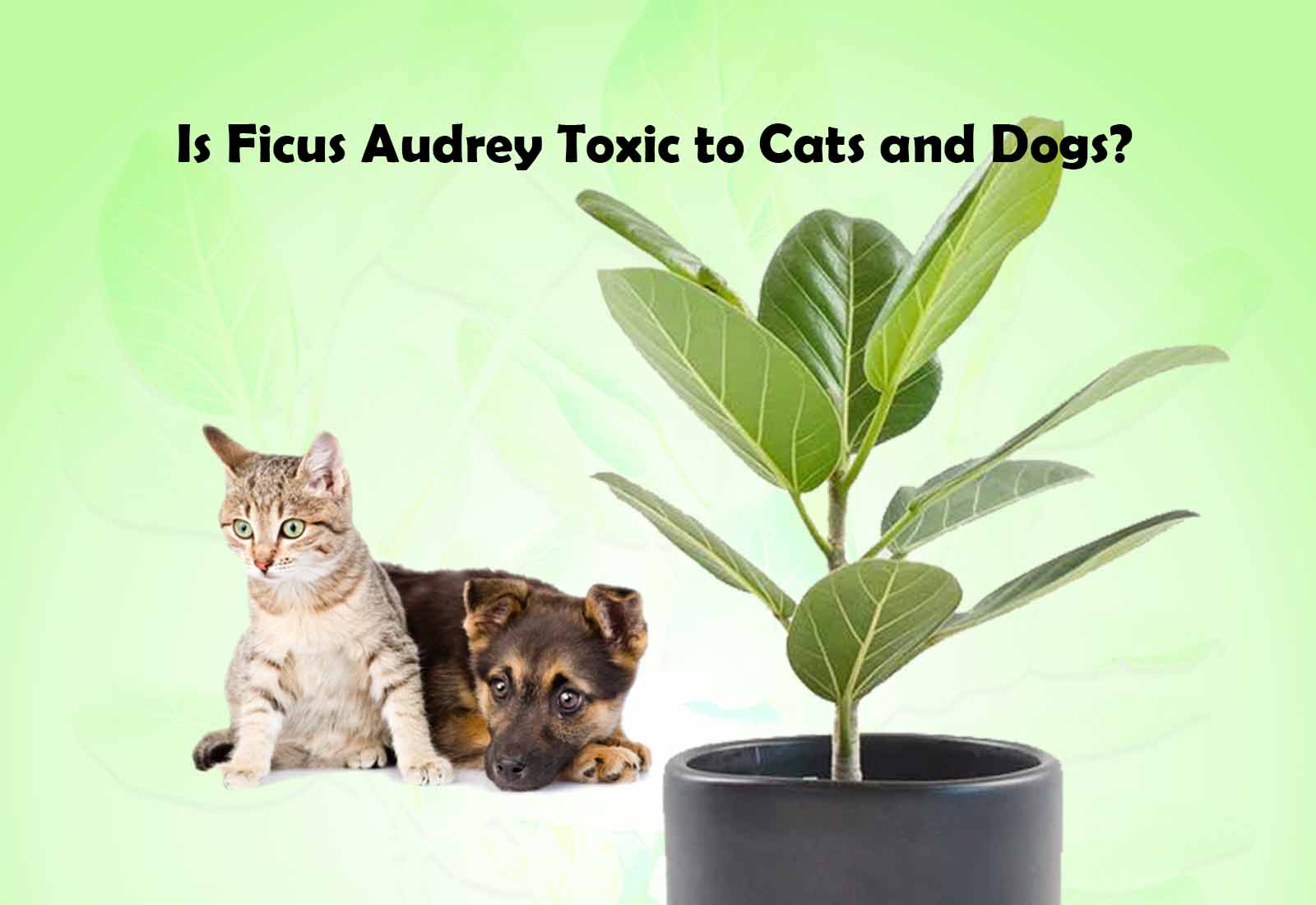Is Ficus Audrey Toxic to Cats and Dogs?
Scientifically known as Ficus benghalensis Audrey, Ficus Audrey has gained popularity as an attractive and relatively low-maintenance houseplant. Known for its fiddle-shaped leaves and deep green foliage, it has become a cherished addition to many homes, adding a touch of natural elegance. However, if you’re a cat owner, there’s an important question you need to consider: Is Ficus Audrey toxic to cats?
Concerns about Audrey’s potential toxicity to pets

While Ficus Audrey’s aesthetic appeal and air-purifying qualities make it a desirable houseplant, concerns arise regarding its potential toxicity to cats and dogs. Pet owners often seek clarity on whether this beautiful plant poses any risks to their furry companions.
Identification of toxic compounds in Ficus Audrey
Several compounds make Ficus Audrey Toxic to cats and dogs. One of the primary toxic components is ficusin, a type of latex found in the plant. This latex can cause irritation and digestive issues when ingested by pets. Ficusin contains proteolytic enzymes that can lead to more severe reactions.
How is Ficus Audrey Toxic to Cats and Dogs
1. Gastrointestinal Distress
Ingesting any part of the Ficus Audrey plant can lead to gastrointestinal discomfort in pets. This may manifest as symptoms such as drooling, vomiting, and diarrhea.
2. Irritation
The latex in Ficus Audrey can irritate the mouth, throat, and digestive tract, resulting in pawing at the face, excessive salivation, and discomfort.
3. More Severe Reactions
In some cases, ingestion of Ficus Audrey can lead to more severe reactions, including difficulty breathing, loss of appetite, and even organ damage in extreme cases.
5 Common signs of poisoning in pets
Recognizing the symptoms of Ficus Audrey toxicity in pets is crucial for prompt action. Common signs of poisoning may include:
| 1. Gastrointestinal Distress | Pets may exhibit symptoms such as vomiting, diarrhea, and excessive drooling. |
| 2. Mouth and Throat Irritation | Irritation of the mouth and throat can lead to pawing at the face, vocalization, and discomfort. |
| 3. Loss of Appetite | Affected pets may lose interest in eating or drinking. |
| 4. Lethargy | A general lack of energy or enthusiasm can be a sign of toxicity. |
| 5. Breathing Difficulties | In severe cases, pets may experience difficulty breathing. |
When to seek immediate veterinary care
Suppose you suspect that your cat or dog has ingested any part of a Ficus Audrey plant and they exhibit any of the above-mentioned symptoms. In that case, it is essential to seek immediate veterinary care. Early intervention can be critical in ensuring your pet’s well-being. Inform your veterinarian about the potential plant ingestion so they can provide the appropriate treatment and guidance.
Tips for keeping Ficus Audrey out of reach
Elevated Placement
Position your Ficus Audrey in a location inaccessible to your pets, such as on a high shelf or in a room your animals do not frequent.
Hanging Baskets
Consider placing your Ficus Audrey in a hanging basket where it’s out of reach for curious paws and noses.
Use Deterrents
Employ pet-friendly deterrents like bitter apple spray on the plant’s leaves or surrounding area to discourage nibbling.
Also Read: Why Ficus Audrey Leaves Curling?
Creating a safe environment for pets and plants
Plant Selection
Opt for houseplants that are non-toxic to pets if you have furry companions at home—research pet-friendly options to ensure a safe environment.
Training
Train your pets to understand boundaries and discourage them from chewing on plants through positive reinforcement.
Supervision
If your pets can access indoor plants, monitor their interactions closely, especially with new additions.
Consult a Vet
If you suspect your pet has ingested any part of a toxic plant, consult your veterinarian immediately for guidance and care.
These preventive measures create a safer living environment for your beloved pets and your cherished houseplants, like the Ficus Audrey.
Responsible pet ownership and plant care
Responsible pet ownership protects your furry companions, including toxic houseplants like Ficus Audrey, from potential hazards. By keeping these plants out of their reach, selecting non-toxic alternatives, and closely monitoring your pets, you can create a safe and harmonious environment where your plants and pets can thrive.
Alternative Plants
If you’re not comfortable having a Ficus Audrey due to its toxicity to cats, consider these pet-safe alternatives:
- Boston Fern
- Spider Plant
- Parlor Palm
- African Violet
- Calathea varieties
Final Words
Is Ficus Audrey toxic to cats?
The short answer is yes, Ficus Audrey is toxic to cats. Like many other members of the Ficus genus, including the well-known Fiddle Leaf Fig, the Ficus Audrey contains compounds that can be harmful if ingested by our feline friends. With its captivating beauty and lush foliage, Ficus Audrey may pose potential risks to your cats and dogs due to toxic compounds, including ficusin and proteolytic enzymes. These components can lead to gastrointestinal distress, mouth and throat irritation, and, in severe cases, more significant health issues.




